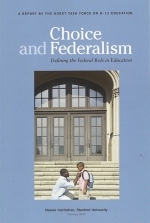Earlier this week, the Koret Task Force of Stanford’s Hoover Institution, which I have the privilege of chairing, issued a bold proposal (primarily crafted by Russ Whitehurst) for totally rebooting the federal role in primary-secondary education.
Washington insiders will, of course, dismiss it as “politically unrealistic” precisely because it is so sweeping and radical. Maybe it will turn out to be. But with ESEA reauthorization in stalemate, the parties at loggerheads, and a total breakdown of the former “consensus” painfully visible, perhaps a sweeping, radical reboot is precisely what is most needed. States that find this reboot appealing can follow the Task Force’s proposal. States that prefer some version of the status quo may stick with it.
The Task Force begins by explaining why neither top-down accountability (à la NCLB) nor total devolution of authority to states and districts can rekindle American education and boost student achievement. Both have been tried—and both have been found sorely wanting.
What to do instead? The Task Force offers a very different approach grounded on two time-honored (and well-proven) American principles: federalism and choice.
But federalism doesn’t mean traditional “local control,” because so many school districts are captives of special interests. Rather, “vibrant, open competition among the providers of education services for students and the funds that accompany them must go hand in hand with federalism.”
And parents must have quality education choices for their children, choices about which they’re well informed. They also must be able to afford these choices, possible if the public dollars (all of them, not just federal ones) devoted to their children’s educations accompany those selfsame children to the schools of their choice and are “weighted” to acknowledge the special needs and higher costs of educating some children.
It’s up to the states, however. Those that cannot or will not embrace the competition-and-choice route may remain with some sort of reauthorized top-down federal arrangement akin to NCLB (and other categorical programs, such as IDEA and Headstart, that would be combined into the choice option).
Indeed, the self-styled “political realists” may turn out to be quite wrong, for the Task Force proposal allows for states to take or leave its ideas—and this choice given to states is a powerful thing.
Have a look—and reflect on whether this might not be better than stalemate.
The Koret Task Force on K-12 Education, Choice and Federalism: Defining the Federal Role in Education, (Stanford, CA: The Hoover Institution, 2012)

